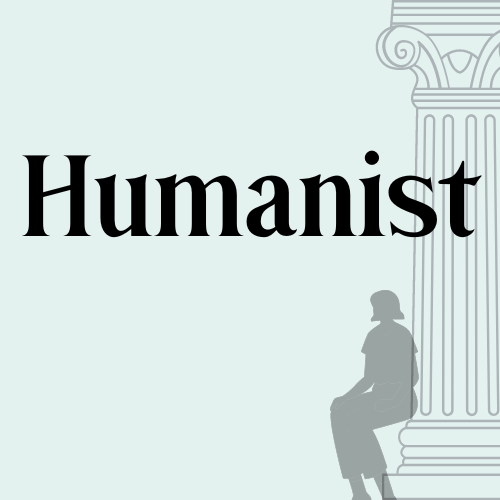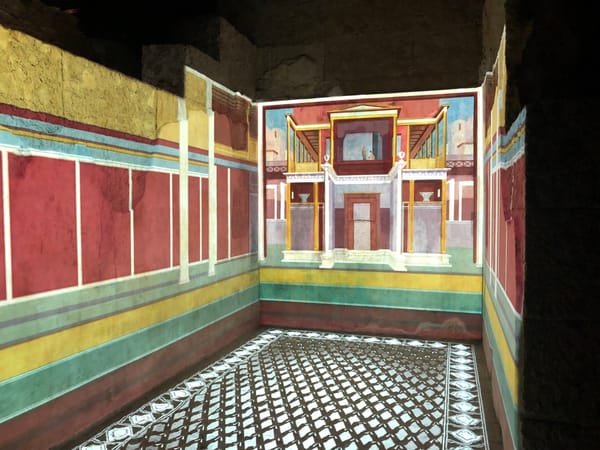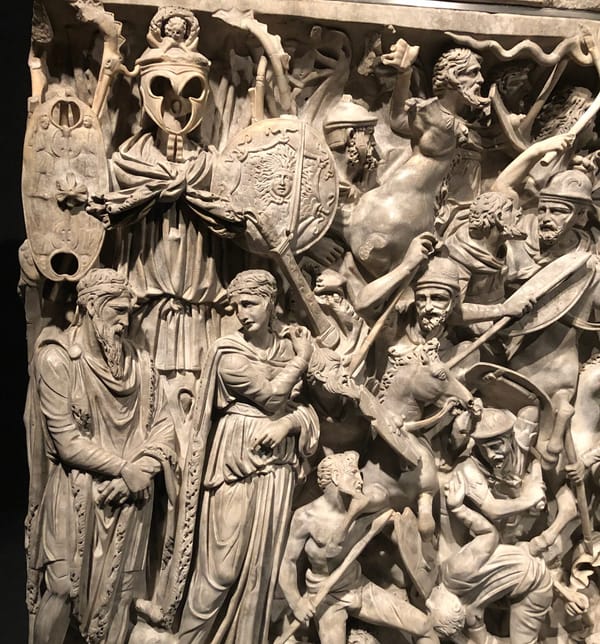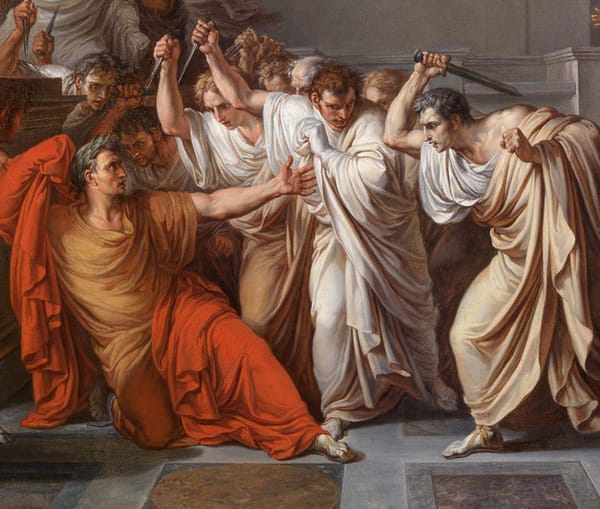Metamorphoses 3: Ovid meets COVID
My students are reading Ovid stateside now, after our program in Rome closed because of the spread of the coronavirus in Italy. We’re all…
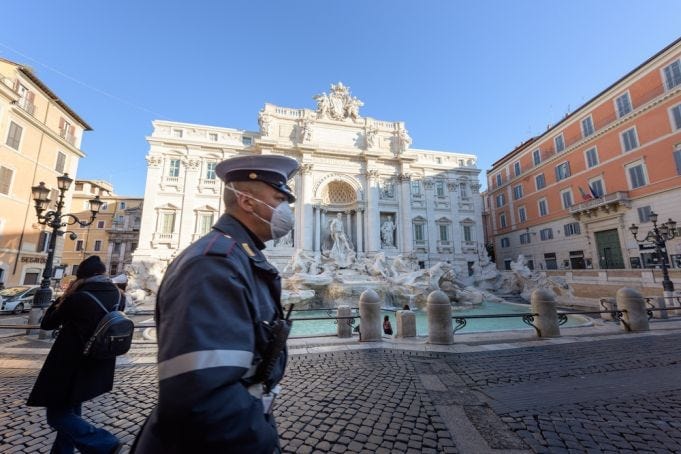
A blog about teaching Ovid’s Metamorphoses in a classical mythology course
My students are reading Ovid stateside now, after our program in Rome closed because of the spread of the coronavirus in Italy. We’re all upset about having to leave, but the situation is grave. As I write this, almost 18,000 people in Italy have tested positive for COVID-19, and over 1,400 people have died. The stories coming out of Italian hospitals are just horrifying. It’s hard not to think of what could happen if the virus follows the same course in the U.S. as it has in Italy. As we read about Italy, are we reading about our own future? Can we do anything to stop it?
Book 3 of Ovid’s Metamorphoses, which my students read this week, is based on stories from Greek tragedy. “Self-isolation” has given me a lot of time to think about the tragic qualities of the COVID-19 pandemic, especially this feeling of staring down the barrel of our own future without being able to change our fate. Lots of characters in Greek tragedies hear oracular prophecies about their future, and it’s easy for us readers to see where things are headed: the characters ignore oracles and seers at their own peril, and dramatic irony looms. How foolish and arrogant they are. I’ve seen lots of people respond with hubris to the pandemic so far, and I hope the result isn’t a tragic disaster. But ultimately, as we live through a pandemic, we’re hearing lots of predictions about what the future holds, and we don’t know who’s right. We might follow Italy’s path, we might not. People with this virus can be contagious even before they start showing symptoms. When I came home from Italy, I might have had the virus already, and I wondered: will I recognize two weeks from now that I had it all along? What will I wish I had done differently? We don’t know what actions we take now will be effective in changing our fates. This uncertainty can make us turn on each other: one of my students said that when she read about Callisto being shunned by Diana and the nymphs because of her “polluting” pregnancy, she thought of a man in the airport in Rome who had smeared hand sanitizer over everything she’d just touched, as if she had polluted it.
Met. 3 tracks the disastrous fates of members of the House of Agenor, the king of Sidon (a.k.a. Tyre, in modern Lebanon). Generation after generation, time after time, members of this family — including, most famously, Actaeon and Pentheus — are destroyed in brutal ways, some as punishment for wrongdoing, and some for no good reason at all, as collateral damage.
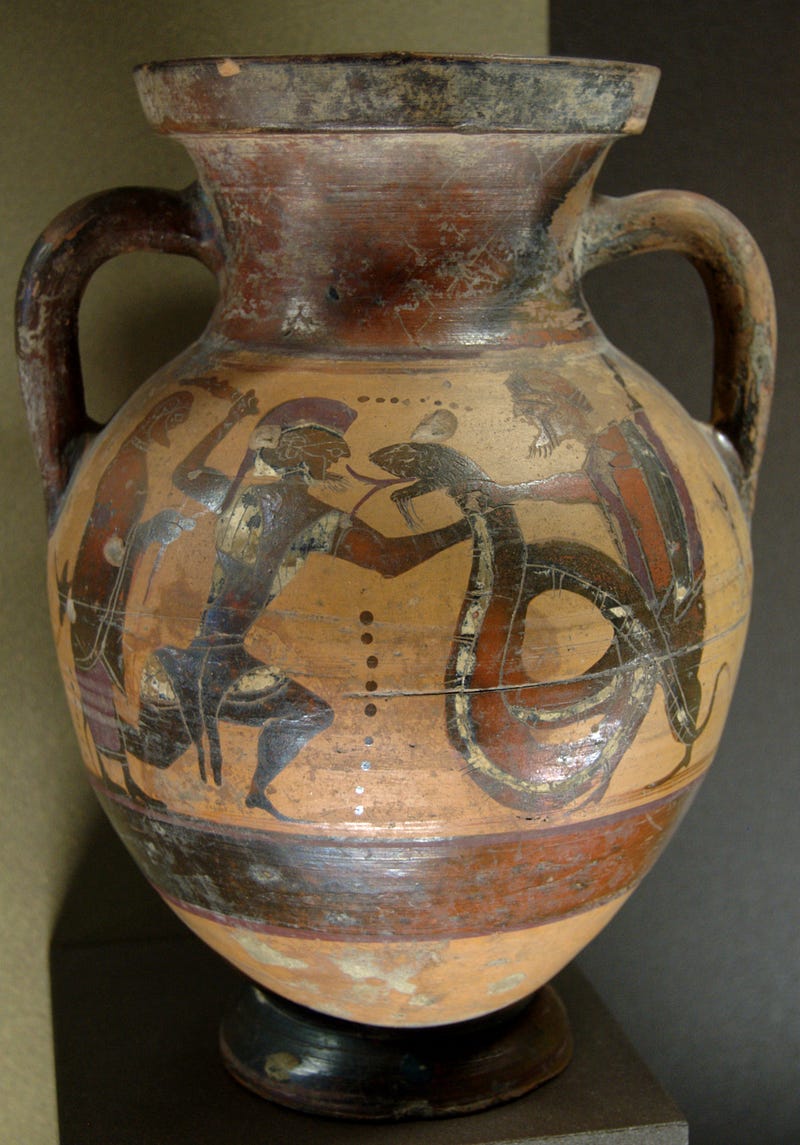
Book 2 of Ovid’s Metamorphoses ended with Jove, disguised as a white bull, carrying Europa over the sea, from Sidon to Crete — but her family doesn’t know that. Her brother, Cadmus, sets out to find her, and goes to the oracle of Apollo at Delphi to ask for guidance. He is told to follow a white heifer (not the bovine he’s looking for) and to establish a city in Greece where she lies down to rest; no word about Europa, “for who is a good enough detective / To catch Jove cheating?” When he sets about founding his city, his servants stumble onto the cave of a monster: a serpent, sacred to Mars, as tall as the constellation Draco in the night sky, who slaughters all of Cadmus’ friends. Cadmus avenges them and fights a great battle with the dragon, then sows its teeth in the earth on Minerva’s instructions. The teeth grow into fully grown, fully armed warriors, who immediately begin to slaughter each other; those who survive and drop their weapons become the founding citizens of Thebes.
That was the city Thebes, and now the exile
Might seem a happy man. Venus and Mars
Were parents of his bride, and there were children
Who turned out well, and children of the children,
Grown to maturity. But always, always,
A man must wait the final day, and no man
Should ever be called happy before burial.
One of these grandsons was the lad Actaeon,
First cause of Cadmus’ sorrow. On his forehead
Horns sprouted, and his hound-dogs came to drink
The blood of their young master. In the story
You will find Actaeon guiltless; put the blame
On luck, not crime: what crime is there in error?
(at bene si quaeras, Fortunae crimen in illo,
non scelus invenies; quod enim scelus error habebat?)(3.131–43, Humphries translation)
As in any ancient tragedy, we have a pretty good idea of the arc this story is going to follow from the start: Cadmus’ happiness will not last. His grandson Actaeon stumbles on the goddess Diana bathing, and as punishment for seeing what he shouldn’t have, she turns him into a stag, to be hunted and killed by his own hunting dogs and human companions.
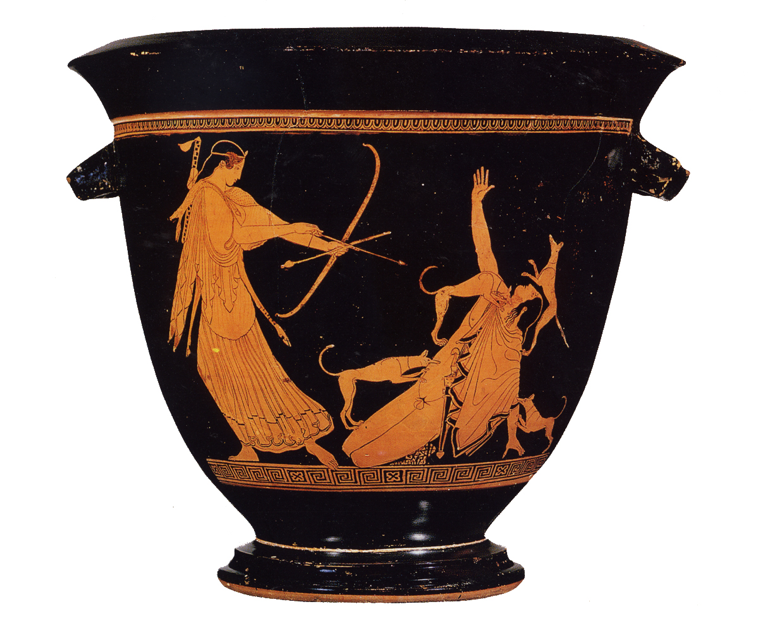
This idea that “no man should ever be called happy before burial” goes back at least as far as Herodotus in Greek literature, another text full of ominous oracles and dramatic disasters. Maybe it’s just the coronavirus, but this dark worldview really seems to be resonating with my students more than I thought it would. The last lines of this passage remind me of Ovid himself, who had been exiled from Rome by the emperor Augustus for “two crimes: a poem and an error,” as he put it (Tristia 2.1.207). (You’ll be relieved to know that the Italian government overturned this sentence in 2017, almost 2,000 years after the poet’s death.) Did Ovid, like Actaeon, inadvertently see something he shouldn’t? He was exiled around the same time as Augustus’ granddaughter, Julia the Younger, and her lover, and many readers have speculated that he was either a witness to her adulterous relationship or somehow involved.
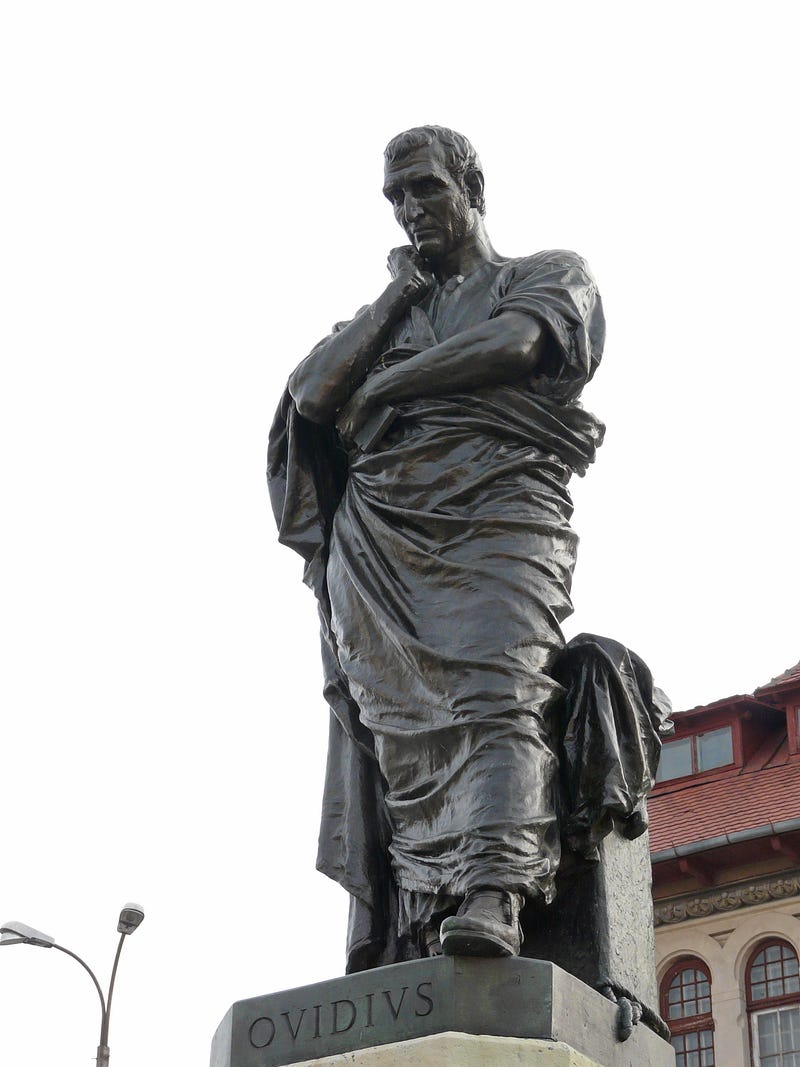
In the meantime, jealous Juno is watching:
And gossip argued
All up and down the land, and every which way:
Some thought the goddess was too merciless
And others praised her; maidenhood, they claimed,
Deserved just such stern acts of reckoning,
And both sides found good reason for their judgment.
Juno alone said nothing, either blame
Or praise, but she was secretly rejoicing
In the disaster to Agenor’s household.
All of Europa’s relatives were guilty
Because Europa had been Juno’s rival,
And now, it seemed, she had another grievance,
Another grudge, for Semele, she knew,
Was pregnant with the seed of Jove. (3.250–63)
Semele, another of Cadmus’ grandchildren, is Jove’s latest conquest; whether their relationship was consensual or not we don’t know, but Juno tricks her into looking at Jove in the godlike form he shows to Juno, which kills Semele. Her baby, the god Dionysus, is saved and gestated in the thigh of Jove. Juno constantly punishes women for Jove’s philandering, and rejoices when any of their blood relatives suffers. She sees these women as threatening her own power as queen of the gods, as if Jove will replace her with a mortal woman.
Next we get an interlude, away from the House of Agenor, to introduce Tiresias. When Jove and Juno disagree on whether men or women get greater pleasure from sex, they turn to Tiresias for answers, because he spent seven years as a woman before being changed back, after a bizarre incident with a pair of mating snakes. Tiresias sides with Jove (women get more pleasure), and in irritation Juno strikes Tiresias blind. His consolation prize from Jove is the gift of prophecy: he gains insight in exchange for sight, as a colleague of mine, David Richman (author of an original play Lives of Tiresias), once put it.
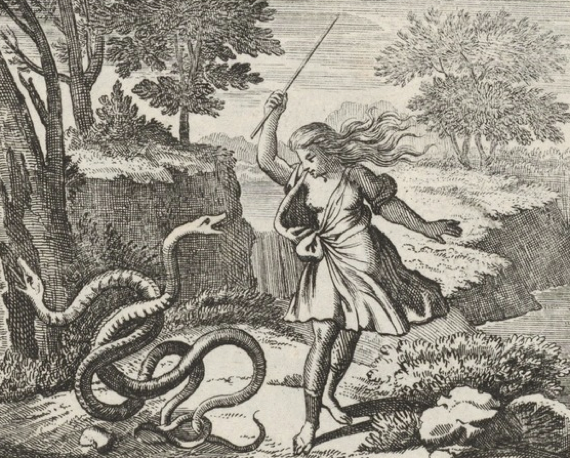
One of Tiresias’ early prophecies is that a young boy, Narcissus, will live a long life as long as “he never knows himself.” This beautiful boy, Ovid tells us, inspired unrequited love in boys and girls alike, but scorned them all, until he saw a boy as beautiful as himself one day in a pool of water:
He is eager
For me to hold him. When my lips go down
To kiss the pool, his rise, he reaches toward me.
You would think that I could touch him — almost nothing
keeps us apart. Come out, whoever you are!
Why do you tease me so? Where do you go
When I am reaching for you? I am surely
Neither so old or ugly as to scare you,
And nymphs have been in love with me. You promise,
I think, some hope with a look of more than friendship.
You reach out arms when I do, and your smile
Follows my smiling; I have seen your tears
When I was tearful; you nod and beckon when I do;
Your lips, it seems, answer when I am talking,
Though what you say I cannot hear. I know
The truth at last. He is myself! I feel it,
I know my image now. I burn with love
of my own self; I start the fire I suffer. (3.448–65)
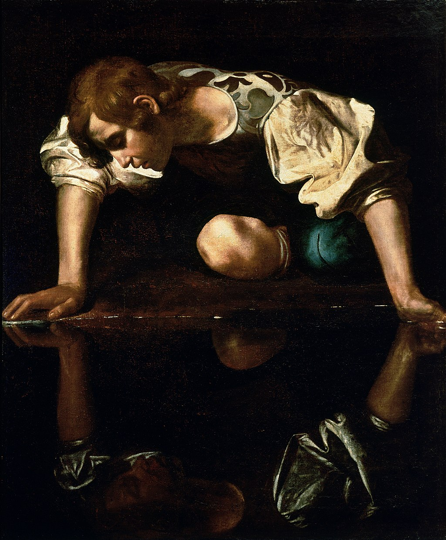
This was by far my students’ favorite passage from their reading this week, and one of them even pointed out that it sounded like a modern teen drama — Narcissus’ nonbinary appearance and admirers of all genders, the pain of unrequited love, toxic self-obsession. The word “narcissist” gets thrown around a lot these days in the era of Instagram influencers and selfies, and Ovid gives such a beautiful illustration of the term’s origin. The nymph Echo, meanwhile, cursed by Juno only to repeat words spoken to her, follows Narcissus around, lovesick, until she wastes away, leaving only her voice.
At the end of Book 3, we return to the House of Agenor (or Cadmus) and to Semele’s son, Bacchus. Cadmus has given up his throne to his grandson Pentheus, the cousin of Bacchus, who refuses — over the warnings of Tiresias — to acknowledge Bacchus as a god, even when the rest of Thebes is possessed and dissolves into Bacchic revelry.
His mother
Was first to see him, with his eyes profaning
the holy orgies, and his mother also
Was first to rush upon him in her madness,
Was first to hurl her wand to strike her son,
Crying: ‘Come, sisters, hurry! A wild boar
Is loose here, and a big one. Strike him down,
follow my lead!’ And they rushed upon him,
All in wild frenzy, harried him, and followed
Wherever he went, and Pentheus, now, was frightened,
frightened, and much less violent in talking,
Cursing himself, admitting all his error.
He was hurt; he recognized his mother’s sister —
‘Help me, Autonoe!’ he cried, ‘Remember
What happened to Actaeon!’ But the woman
Apparently knew nothing of Actaeon,
nor cared… (3.706-22)
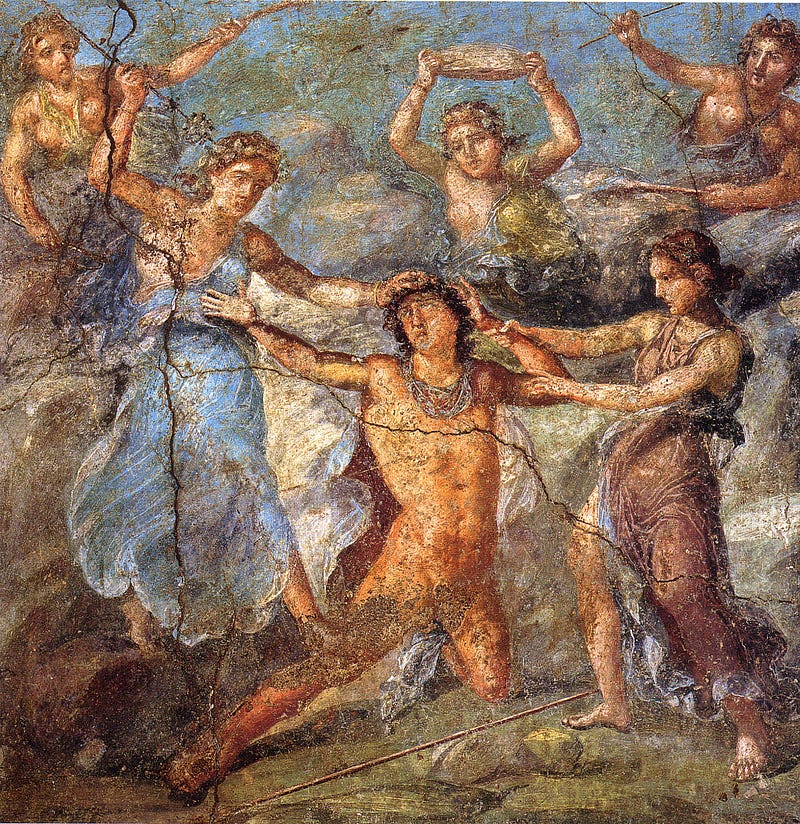
This story of Pentheus is all told in Euripides’ tragedy, the Bacchae (I sent my students this clip of a rehearsal at the British American Drama Academy). Ovid condenses the story to make just one part of Book 3, one of many episodes in the House of Agenor series, so that you get a sense of how the whole family drama plays out. In Ovid’s version, Bacchus is only the latest god to punish the ruling family of Thebes; his mother was punished by Juno, and he visits a punishment of his own on his mother’s sisters. Pentheus, his cousin, cries out his cousin Actaeon’s name but suffers a similar fate anyway. At least Pentheus is punished for his own actions and decisions. Tiresias told Pentheus that he’d be torn into a thousand pieces if he scorned Bacchus, and Pentheus “flung him / Aside before he even finished speaking, / But what he said came true.”
Maybe other news outlets told Pentheus that Bacchus was a hoax.
